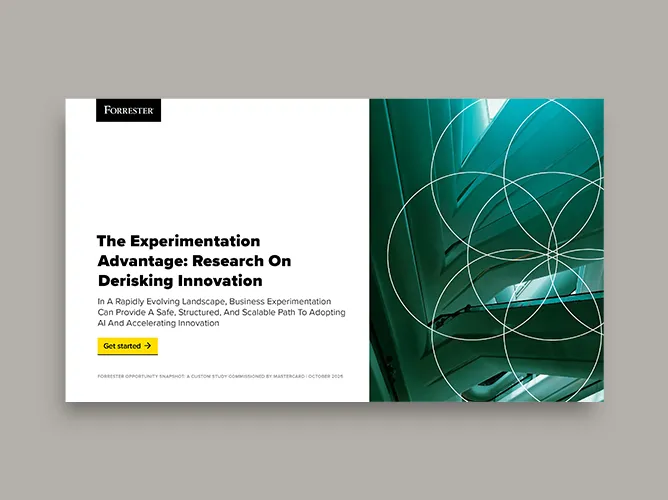Published: September 25, 2020 | Updated: June 18, 2025
Read time: 5 minutes
Let us imagine we are in 2021, and the world has left behind the worst of Covid-19. No doubt, life has changed, and governments, companies and individuals are adapting to a “new normal.”
Our Chronicles series will help readers understand what is likely to be different in a post-Covid-19 world. We will also look at how players in the payments ecosystem are already adapting today to successfully emerge from this unprecedented shock to the economy and our daily lives.
This week, we focus on how banks can work with startups to drive innovation and quickly adapt and respond to challenges and opportunities emerging from Covid-19. Innovation has been high on bank agendas for many years. However, the pace and abruptness of change in socioeconomics during the pandemic have made innovation, speed and agility more important for banks to stay relevant to customers, optimize operating models and be better prepared for future global events.
We hypothesize that collaborating with startups can help banks not only adapt but, more importantly, thrive in the post-Covid-19 environment and be better prepared for a more uncertain future.
The Time is Ripe for Bank and Start-up Collaboration
Covid-19 has led to fundamental disruptions across industries. It introduced new commerce and payment behaviors and accelerated some existing trends. Banks will potentially need to tackle the following consumer trends:
- Increased adoption of contactless and mobile wallets. The frictionless nature of touchless experiences could turn it into a sustained habit. In a Mastercard consumer study of contactless payments this year, 79% of respondents worldwide said they are now using contactless to make purchases, and 74% plan to continue post-pandemic.
- Possible financial impact on salaries and debt repayments, especially for lower-income consumers.
- Increased demand for a full range of digital, easy and secure banking services.
- New consumer segments and spend categories transitioning to e-commerce.
- Temporarily reduced international air travel.
To succeed in the Covid-19 aftermath, banks will need to respond to their existing customers’ needs while adapting to new ways of attracting and retaining customers. As banks redefine their strategies, they could benefit from building a digital-first value proposition and offering digital features and engagement paths to build on the adoption of digital payments/banking. They should also look at improving credit decisions by leveraging alternate data sources and better risk assessment tools, as well as tapping into underserved segments. Banks will also need to consider tapping into the power of data to inform forward-looking strategy as it relates to product, marketing and operations
However, acting on their own, some banks face possible legacy challenges, exacerbated by the effects of Covid-19, to move quickly. Some of those legacy challenges include outdated banking systems, regulatory and market pressures and cost burdens associated with maintaining a brick-and-mortar presence.
"Startup partnerships allow banks to tap into cutting edge technologies to launch products, leverage data insights and expand geographically quickly."
Startup partnerships allow banks to tap into cutting edge technologies to launch products, leverage data insights and expand geographically quickly. They can also help break organizational siloes and ingest fresh approaches, creativity and problem-solving focus.
Post-Covid-19, startups are also likely to need incumbent banks more than ever as investors’ risk appetites and funding availabilities may be lower. Partnerships with banks can help startups grow by providing access to a large customer base, in-house expertise on compliance and regulatory requirements, and funding. Association with a bank brand helps startups build credibility, as consumers still tend to rely more on incumbent bank brands for safety and security.1
Bank-Startup Partnerships May Accelerate
We believe Covid-19 can advance the long history of partnerships between banks and startups. The growth of millennials as a share of the overall population, the rise of the on-demand culture, and tech advancements have fueled the proliferation of startups, especially fintechs, as compelling alternatives to traditional incumbents.
Today, 12,213 startups globally, including 67 fintechs, are valued at $1 billion or more.2 Between 2016 and 2019, venture capital startup investment grew 76% to US$35 billion, and the number of deals increased by 40% to 2,033.3
While incumbent banks initially perceived the proliferation of fintechs as a threat to their market share, over time, both banks and fintechs have acknowledged that they have complementary contributions that are ripe for partnership opportunities.
Open banking and finance regulations and industry trends around the world have accelerated the need for partnerships. More than half (63%) of banks invest in startups or offer an in-house fintech accelerator. Since 2012, the top ten U.S. banks have invested $3.6 billion in 56 fintech startups.4 And most (81%) bank executives surveyed said that collaborating with partners was the best strategy to achieve digital transformation.5
Traditional banks tend to have a wide reach, strong credibility and established compliance and regulatory processes. Fintechs offer digital-first products and solutions, strong technological capabilities and agile ways of working conducive to innovation.
How to collaborate with startups post Covid-19?
To thrive in the post-Covid-19 environment, banks can look to startup partnerships to potentially drive innovation and to quickly and effectively adopt a data-driven digital-first approach.
Mastercard helps banks identify and forge such startup partnerships effectively and efficiently via Start Path – Mastercard’s award-winning startup engagement program with 230+ hand-picked global startups. We also tap into Mastercard Advisors’ startup engagement advisory services to identify, pilot and bring to market such partnership opportunities.
3 key areas where banks should focus:
1. Digital-first value propositions: Banks can work with startups to quickly enhance existing products or launch new products that are a better fit for the accelerated shift to everything digital.
Adopting a digital-first approach to designing or enhancing value propositions is challenging for most banks. It requires a potentially significant investment to change the legacy core banking platforms.
Startups can offer shortcuts to digitizing value propositions by allowing banks to:
- Modernize their core banking platforms with the latest technologies that minimize associated costs and risks and bring in the flexibility to design digital-first propositions from the onset.
- Launch fintech products that address changing customer needs quickly and effectively.
- Rapidly enhance mobile banking applications with capabilities that elevate bank brand/e-wallet usage to top of mind.
- Facilitate touchless payment experiences in popular spend categories, like groceries and gasoline.
- Create effective digital engagement channels by enriching customers’ digital social interactions and offering seamless payment functionalities exactly when needed.
- Test and learn to see if market research results translate to in-market results.
2. Partner with startups to digitize servicing: Banks should adopt newer technologies such as artificial intelligence (AI) and machine learning (ML) to increase operating flexibility, lower operational costs and responsibly leverage data to better serve and engage customers. Customer retention will be more critical and challenging than ever.
Startups have the latest technologies to rapidly integrate into banks’ call centers and branch/ATM operations. However, banks should conduct proper due diligence on data-driven startups, which sometimes lack resources or focus to ensure data innovation principles are applied to protect individuals from unintended harm, inaccuracies and biased, discriminatory outcomes.
Adopting AI/ML to increase automation of repetitive, lower-value work and exploit data to better serve customers was already underway before the pandemic. For example, chatbots were already well established in financial services and had improved the more they were used.
Traditional chat-based bots are also paving the way for adopting conversational-first bots and virtual agents, which are better suited to how people naturally interact – via speech, visual cues and hand gestures vs. typing text messages.
Banks already using virtual agents should consider expanding them to functions such as debt collections, lead generation, sales, inquiries and addressing specific programs.
3. Data-driven decision-making: Banks can work with startups to access the latest technologies, such as AI and ML, to maximize the value of their data as well as their alternative data. This can inform all aspects of their business, from strategy and marketing to customer experience and risk management.
Covid-19 will continue to accelerate the adoption of data-driven decision-making to inform key issuer business functions, from strategy and product to marketing and risk management. Banks see the following benefits:
- Better management of risk whether it is for investing in a certain segment, product, strategy or for extending credit
- Greater efficiencies and improved return on investment in product enhancements, brand management and customer engagement
- Enhanced customer experience with personalization and targeted offers
- Opening up significant markets by enabling the ability to serve underserved segments with the use of new data sources, such as telecom data
Banks should partner with startups to tap into the latest technologies to leverage additional data sources that have historically been out of reach and build strong data analytics capabilities that generate timely and actionable insights.
Of course, these recommendations are broad, and every challenge and every organization is different. For more guidance on managing disputes within your business, reach out to Fabrizio Burlando or Raul Escribano. Feel free to reach out to the Chronicles team with any other questions about the new normal.
1“The State of Pay 2019-2020,” www.vocalink.com/news-insights/research-reports-white-papers/the-state-of-pay-2019 2State of Fintech Q1 ‘20 Report: Investments & Sector Trends to Watch (CB Insights); Statista; Where Top US Banks Are Betting On Fintech (CB Insights, August 2019); Business Insider (Gregory Magana, Oct 2, 2019)
3State of Fintech Q1 ‘20 Report: Investments & Sector Trends to Watch (CB Insights); Statista; Where Top US Banks Are Betting On Fintech (CB Insights, August 2019); Business Insider (Gregory Magana, Oct 2, 2019)4Exponential Trends in Fintech, a Singularity University Industry Insights Report5State of Fintech Q1 ‘20 Report: Investments & Sector Trends to Watch (CB Insights); Statista; Where Top US Banks Are Betting On Fintech (CB Insights, August 2019); Business Insider (Gregory Magana, Oct 2, 2019)










